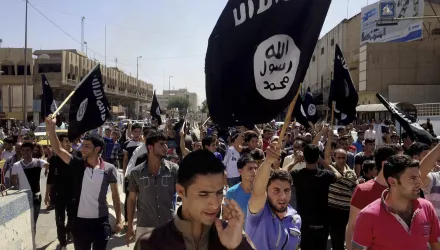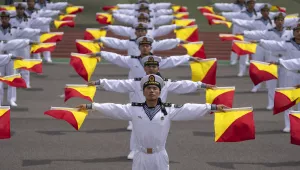International Security is America's leading peer-reviewed journal of security affairs.
Stigmatizing the Bomb: Origins of the Nuclear Taboo
"Nuclear weapons have come to be defined as abhorrent and unacceptable weapons of mass destruction." So argues Nina Tannenwald of Brown University, who traces and analyzes the development of a nuclear taboo in world politics and U.S. policy.Tannenwald attributes the success of the nuclear taboo to three factors: a global grassroots antinuclear weapons movement, the efforts of nonnuclear states, and the role of Cold War power politics. She closes with some thoughts on ways to further strengthen the taboo, including the creation of a no-first-use agreement and the ratification of a comprehensive nuclear test ban treaty.
Russian Scientists and Rogue States: Does Western Assistance Reduce the Proliferation Threat?
Deborah Yarsike Ball of Lawrence Livermore National Laboratory and Theodore Gerber of the University of Wisconsin consider the likelihood of Russian scientists with knowledge of nuclear, chemical, or biological weapons selling their expertise to so-called rogue states seeking to produce weapons of mass destruction. Using data collected in an unprecedented survey of Russian WMD scientists, the authors assess the effectiveness of U.S. and Western nonproliferation assistance programs aimed at keeping these scientists employed in Russia, where, since the collapse of the Soviet Union, they have watched their salaries plummet and their prospects of job security sharply decline. Although these programs have been quite effective, one-fifth of the survey's participants stated they would consider working in a "rogue" state, a possibility that policymakers must address.
September 11 and the Adaptation Failure of U.S. Intelligence Agencies
Amy Zegart of the University of California, Los Angeles, asserts that the vulnerability of the United States to the terrorist attacks of September 11, 2001, is explained by the failure of U.S. intelligence agencies to adapt to the rise of the terrorist challenge following the collapse of the Soviet Union and the end of the Cold War. Zegart presents evidence suggesting that although policymakers were well aware of the terrorist
threat and realized the need for organizational change in the U.S. intelligence community, they were unable to achieve the reforms that several blue-ribbon commissions and studies urgently recommended before the September 11 attacks. Zegart contends that three factors explain the intelligence community failure to adapt: the nature of bureaucratic organizations; the selfinterest of presidents, legislators, and government bureaucrats; and the fragmented structure of the federal government.
The Roots of the Bush Doctrine: Power, Nationalism, and Democracy Promotion in U.S. Strategy
The promotion of democracy is central to the Bush administration's fight against terrorism and its overall grand strategy, which holds that the U.S. political and security interests are advanced by the spread of liberal political institutions and values abroad. Jonathan Monten of Georgetown University examines two contending approaches to the long-term promotion of democratic change: leading by example versus the direct application of U.S. power, including the use of coercive force.
Who's Keeping the Peace? Regionalization and Contemporary Peace Operations
Alex Bellamy of the University of Queensland and Paul Williams of the University of Birmingham assess the prevalence and effectiveness of recent peace operations conducted without United Nations Security Council authorization. The authors assert that the prevalence of such operations is not a UN phenomenon per se because it has rarely challenged international society's foundational norm of nonintervention.
Letters to the Editors
The issue concludes with two sets of correspondence. In the first set, Ronald Krebs and Chaim Kaufmann discuss the marketplace of ideas and the Iraq War. In the second, Ernest May and Philip Zelikow dispute several points made by Richard Falkenrath in his Winter 2004/05 review of The 9/11 Commission Report.



